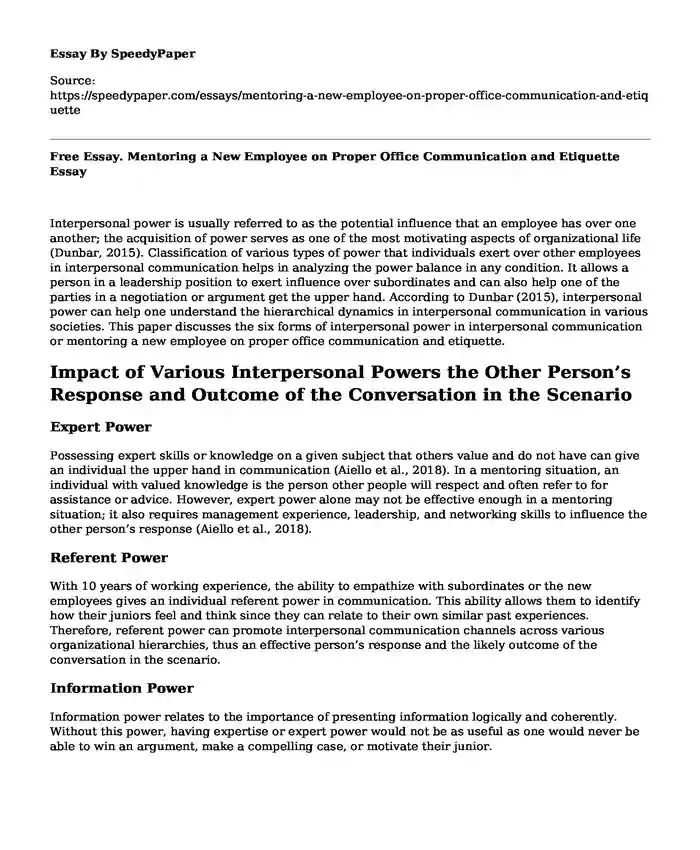
| Essay type: | Rhetorical analysis essays |
| Categories: | Human resources Employment Motivation |
| Pages: | 3 |
| Wordcount: | 815 words |
Interpersonal power is usually referred to as the potential influence that an employee has over one another; the acquisition of power serves as one of the most motivating aspects of organizational life (Dunbar, 2015). Classification of various types of power that individuals exert over other employees in interpersonal communication helps in analyzing the power balance in any condition. It allows a person in a leadership position to exert influence over subordinates and can also help one of the parties in a negotiation or argument get the upper hand. According to Dunbar (2015), interpersonal power can help one understand the hierarchical dynamics in interpersonal communication in various societies. This paper discusses the six forms of interpersonal power in interpersonal communication or mentoring a new employee on proper office communication and etiquette.
Impact of Various Interpersonal Powers the Other Person’s Response and Outcome of the Conversation in the Scenario
Expert Power
Possessing expert skills or knowledge on a given subject that others value and do not have can give an individual the upper hand in communication (Aiello et al., 2018). In a mentoring situation, an individual with valued knowledge is the person other people will respect and often refer to for assistance or advice. However, expert power alone may not be effective enough in a mentoring situation; it also requires management experience, leadership, and networking skills to influence the other person’s response (Aiello et al., 2018).
Referent Power
With 10 years of working experience, the ability to empathize with subordinates or the new employees gives an individual referent power in communication. This ability allows them to identify how their juniors feel and think since they can relate to their own similar past experiences. Therefore, referent power can promote interpersonal communication channels across various organizational hierarchies, thus an effective person’s response and the likely outcome of the conversation in the scenario.
Information Power
Information power relates to the importance of presenting information logically and coherently. Without this power, having expertise or expert power would not be as useful as one would never be able to win an argument, make a compelling case, or motivate their junior.
Legitimate Power
Legitimate power in various interpersonal communications usually comes from formal titles like mentor, manager, owner, or coach. Legitimate power effectiveness generally depends on how an individual uses it. If individuals abuse their authority, they may lose legitimacy and become less effective. However, if one uses the power judiciously to help and do good to other people, they enhance their power and become more effective.
Reward Power
Reward power usually supports legitimate power. The new employees under mentorship are likely to respond favorably to directions and orders if they receive a tangible reward, such as a pay raise or a better job task. Other rewards may also include encouragement, praise, and verbal approval, which may also be as effective as tangible rewards.
Coercive Power
Coercive power seems to be the opposite of reward power. It is the ability to punish an individual or an employee for noncompliance with a direction or an order. It also seems to complement legitimate power, but negatively since such compliances are achieved out of fear but not out of respect. Some coercive power examples may include denial of promotion, labor union strike threats, or litigation and pay raises.
Interpersonal Powers that Would Produce the Most Favorable Outcomes
The Expert power
Every organization’s department has an individual that other people turn to for work advice and assistance. These pieces of advice can range from technical assistance to how to operate with a co-worker effectively (Aiello et al., 2018). Once an individual is identified as an expert, other people, including new employees, tend to come to experts for advice in specific areas leading to favorable outcomes. For instance, professors probably have power in a classroom due to their mastery of a specific subject matter. Other instances of expert power are often seen in staff specialists in businesses (Aiello et al., 2018). For example, accountants, management consultants, labor relations managers, and corporate attorneys are some of the major experts in various organizations.
Legitimate Power
Legitimate power usually exists when a new employee submits to a mentor because the employee feels that the mentor has a right to exert power in a particular domain leading to favorable outcomes. For instance, a supervisor has the right to assign a task to other employees (Aiello et al., 2018).
In conclusion, power and influence in organizations are needed to get things done and accomplish personal and organizational objectives.
References
Aiello, A., Tesi, A., Pratto, F., & Pierro, A. (2018). Social dominance and interpersonal power: Asymmetrical relationships within hierarchyenhancing and hierarchyattenuating work environments. Journal of Applied Social Psychology, 48(1), 35-45. https://arpi.unipi.it/handle/11568/806083
Dunbar, N. E. (2015). A review of theoretical approaches to interpersonal power. Review of Communication, 15(1), 1-18. https://www.tandfonline.com/doi/abs/10.1080/15358593.2015.1016310
Cite this page
Free Essay. Mentoring a New Employee on Proper Office Communication and Etiquette. (2023, Nov 12). Retrieved from https://speedypaper.net/essays/mentoring-a-new-employee-on-proper-office-communication-and-etiquette
Request Removal
If you are the original author of this essay and no longer wish to have it published on the SpeedyPaper website, please click below to request its removal:
- I Believe - Personal Essay Example
- Free Essay Sample on International Law
- Can We Create Our Own Happiness? Free Essay Sample
- Free Essay on Application of Theory/Concepts: Interview With an Adolescent
- Free Essay. Illegal Hiring Analysis
- Free Essay Sample on Situation Clinical Encounter
- Community Involvement and Engagement in Ending Women's Sexual Violence - Free Paper Example
Popular categories




